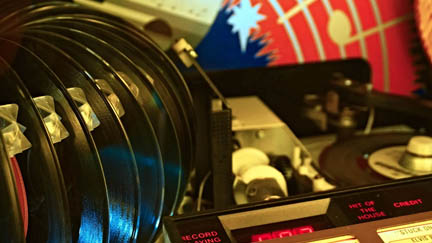
A jukebox is a partially automated music-playing device, usually a coin-operated machine, that will play a patron's selection from self-contained media. The classic jukebox has buttons, with letters and numbers on them, which, when one of each group entered after each other, are used to select a specific record.
Some may use Compact Discs instead. Disc changers are similar devices that are intended for home use, are small enough to fit in a shelf, may hold up to 400 discs, and allow discs to be easily removed, replaced, and inserted by the user.
In 1950, the Seeburg Corporation introduced an all 45 rpm vinyl record jukebox. Since the 45s were smaller and lighter, they soon became the dominant jukebox media for the last half of the 20th century.
33⅓ RPM, CDs, and videos on DVDs were all introduced and used in the last decades of the century. MP3 downloads, and Internet-connected media players came in at the start of the 21st century.
The jukebox's history has followed the wave of technological improvements in music reproduction and distribution. With its large speaker size, facilitating low-frequency (rhythm) reproduction, and large amplifier, the jukebox played sound with higher quality and volume than the listener could in his or her home, sometimes music with a "beat" (strong bass, made possible by the large speakers).
While often associated with early rock and roll music (which by at least one source is said to have begun in the mid 1940s), the popularity of jukeboxes extends back much earlier, including classical music, opera and the swing music era (originating in the 1930s).
Jukeboxes were most popular from the 1940s through the mid-1960s, particularly during the 1950s. By the middle of the 1940s, three-quarters of the records produced in America went into jukeboxes. Billboard published a record chart measuring jukebox play during the 1950s, which briefly became a component of the Hot 100; by 1959, the jukebox's popularity had waned to the point where Billboard ceased publishing the chart and stopped collecting jukebox play data.
In 1977, The Kinks recorded a song called "Juke Box Music" for their album Sleepwalker.

Models designed and produced in the late 20th century needed more panel space for the increased number of record titles they needed to present for selection, reducing the space available for decoration, leading to less ornate styling in favor of functionality and less maintenance.
Two companies still manufacture classically styled jukeboxes: Rockola, based in California, and Sound Leisure, based in Leeds in the UK. Both companies manufacture jukeboxes based on a CD playing mechanism. However, in April 2016, Sound Leisure showed a prototype of a "Vinyl Rocket" at the UK Classic Car Show. It stated that it would start production of the 140 7" vinyl selector (70 records) in summer of the same year.
Since 2018, Orphéau, based in Brittany in France manufactures the original styled "Sunflower" Jukebox with the first 12" vinyl record selector (20 records), on both sides.
